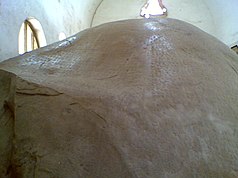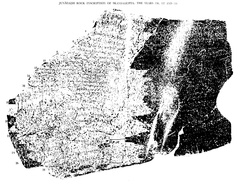Sudarshana Lake
Sudarshana Lake is an artificial lake located in the semi-arid region of Kathiawar.[1] The lake was originally commissioned by Chandragupta Maurya and later renovated by several kings across different dynasties.[2][3]
| Sudarshana Lake | |
|---|---|
 | |
| Location | Bhavnath, Girnar, Gujarat |
| Coordinates | 21°31′38″N 70°30′13″E / 21.5272°N 70.5035°E |
| Lake type | Ancient lake, Man-made lake |
| Settlements | Girnar |
History
[edit]Sudarshana Lake was originally constructed by Pushyagupta, a governor under the Maurya emperor Chandragupta Maurya (c. 320–297 BCE). The lake was built as part of a water conservation project in the semi-arid region of Kathiawar, now Gujarat.[4] Later, during the reign of Ashoka (c. 268–232 BCE), the lake underwent renovations by Tushaspha, a governor appointed by Ashoka.

The lake suffered damage in the 2nd century CE due to heavy rains, which led to a breach in the dam. In 150 CE, Rudradaman I, a king of the Western Kshatrapas, undertook a major renovation as recorded in the Junagadh Rock Inscription of Rudradaman. The lake was also repaired by Suvisakha, a Parthian governor under Rudradaman.[5]
(L.8)... for the sake of ordered to be made by the Vaishya Pushyagupta, the provincial governor of the Maurya king Chandragupta Maurya; adorned with conduits for Ashoka the Maurya by the Yavana king Tushaspha while governing; and by the conduit ordered to be made by him, constructed in a manner worthy of a king (and) seen in that breach, the extensive dam.
—Junagadh rock inscription of Rudradaman[6][7]
The lake was also restored by Chakrapalita, the son of Parnadatta, the governor of Saurashtra under King Skandagupta.[8] Chakrapalita repaired the breach and rebuilt the embankment—100 cubits long, 68 cubits wide, and as tall as seven men—in just two months.[9][10]
Architecture
[edit]Sudarshana Lake has an elaborate system of channels and conduits that were constructed to direct water into the lake. The embankment of the lake was reportedly 100 cubits long, 68 cubits wide, and 7 cubits high.[9][12]
See also
[edit]References
[edit]- ^
- Davis, Richard H. (2024-11-26). Religions of Early India: A Cultural History. Princeton University Press. p. 313. ISBN 978-0-691-26578-0.
On the night of 16 November 150 CE, a fierce storm raged in from the Arabian Sea onto the shores of Gujarat. The rain clouds pouring out their waters, it was reported, made it appear as if the earth had been turned into one big ocean. In the path of the storm's destructive floods was a man-made reservoir called Lake Good-Looking (Sudarshana). The lake had been excavated several centuries before, by order of the Mauryan rulers Chandragupta
- "Sudarshana Lake | lake, India | Britannica". www.britannica.com. Retrieved 2024-11-17.
…the dam and conduits at Sudarshana, a man-made lake on the Kathiawar Peninsula.
- Tandle, Dr Sanjeevkumar. INDIAN HISTORY. Lulu.com. p. 132. ISBN 978-1-312-37211-5.
Sudarshana lake in the semi-arid zone of Kathiawar. This lake had been in use for irrigation for a long time, and was old as the time of the Mauryas.
- Davis, Richard H. (2024-11-26). Religions of Early India: A Cultural History. Princeton University Press. p. 313. ISBN 978-0-691-26578-0.
- ^ Singh, Upinder (2008). A History of Ancient and Early Medieval India: From the Stone Age to the 12th Century. Pearson Education India. p. 380. ISBN 978-81-317-1120-0.
The purpose of the inscription is to record the restoration of a reservoir called Sudarshana lake by the mahakshatrapa Rudradaman . The construction of this reservoir was started by Vaishya Pushyagupta , the provincial governor of Chandragupta Maurya . It was completed by the Yavana Tushaspha , governor of the Ashoka.
- ^ a b Singh, Upinder (2016). Ancient and Early Medieval India. pp. 48–49.
A 150 CE inscription of the Shaka ruler Rudradaman records the beginning of the construction of a water reservoir known as Sudarshana lake in the 4th century BCE during the time of the Maurya emperor Chandragupta, its completion during the reign of Ashoka, and its repair in the 2nd century CE. A 5th century inscription on the same rock, of the time of the Gupta king Skandagupta, describes how the lake burst its banks due to excessive rains and was repaired after two years work.
- ^ Thapar, Romila (2004). From the Origins to AD 1300. University of California Press. p. 187. ISBN 978-0-520-24225-8.
Taxes for the provision of water for irrigation were regularly collected wherever the state was responsible for providing irrigation. One of Chandragupta's governors had a dam built across a river near Girnar in western India, thus constructing the Sudarshana lake to supply water for the region. An inscription in the neighbourhood mentions the continuous maintenance of this dam for 800 years, stating that it was built through local but official initiative.
- ^ M. S. Randhawa. History Agriculture India, Volume I. INDIAN COUNCIL OF AGRICULTURAL RESEARCH, NEW DELHI. p. 363.
The Junagadh rock inscription of Rudradaman records that the Sudarshana lake was constructed by Pushyagupta, the provincial governor of Chandragupta Maurya; it was subsequently provided with conduits by the Yavana king Thushaspha for Asoka Maurya. It suffered a breach (420 cubits long and 75 cubits deep) in the second century of the Christian Era, owing to heavy flood in the rivers Suvarnarekha and Palasini. It was repaired by the Parthian Amatya Suvisakha, who was the governor of Rudradaman, the Saka ruler of that time. In western India, the successors of Rudradaman continued the tradition of constructing tanks.
- ^ Epigraphia Indica, Vol. VIII. Calcutta: Office of the Superintendent of Government Printing, 1905-6, 45-49
- ^ "Junagadh Rock Inscription of Rudradaman", Project South Asia.Archived 23 February 2009 at the Wayback Machine
- ^ History Of India From C 300 To 1206. Indira Gandhi National Open University. p. 17.
The Junagadh inscription of his reign tells us about the public works undertaken during his times. The Sudarshana lake (originally built during the Maurya times) burst due to excessive rains and in the early part of his rule his governor Pamadatta got it repaired. This indicates that the state undertook the task of public works. The last known date of Skandagupta is 467 CE from his silver coins.
- ^ a b V.D, Mahajan. Ancient India. S. Chand Publishing. p. 386. ISBN 978-93-5253-132-5.
The Sudarshana Lake became Durdarshana Lake. The citizens were in despair and did not know what to do. However, Chakrapalita came to their rescue. He was full of regard for the welfare of his city and for the king. He had the breach repaired and the embankment renewed by an expenditure of unlimited wealth within the short period of two months. The embankment was 100 cubits long, 68 broad and 7 men's height. Chakrapalita also constructed the temple of God Chakrabhrit.
- ^ Jayaswal, Vidula (2001). Royal Temples of Gupta Period: Excavations at Bhitari. Aryan Books International. p. 9. ISBN 978-81-7305-207-1.
..the repair of the Sudarshan lake and construction of two temples by Chakrapalita, the son of the governor of Saurashtra, Parnadatta, who was appointed by the monarch, Skandagupta.
- ^ "Junagadh Rock Inscription of Rudradaman", Project South Asia. Archived 23 February 2009 at the Wayback Machine
- ^ Shaikh, Dr Shahajahan B. (2017-09-04). Archaeological Study of Kandhar (Dist. Nanded, Maharashtra). p. 28. ISBN 978-1-387-15993-2.
While considering the history of India, it appears that kings, noblemen, and the rich created ponds and lakes thinking it their duty and maintained them well In Girnar mountains in Saurashtra, Chandragupta Maurya's (324- BC) regent Pushya of Dhant built Sudarshana lake by rain water harvesting. Later on Ashoka's depute Tushasph renovated it and made the waiter of the lake available for irrigation. Around 150 AD when tha lake was washed away by heavy rains, the King Mahakshatrapa Rudradaman repaired it.


